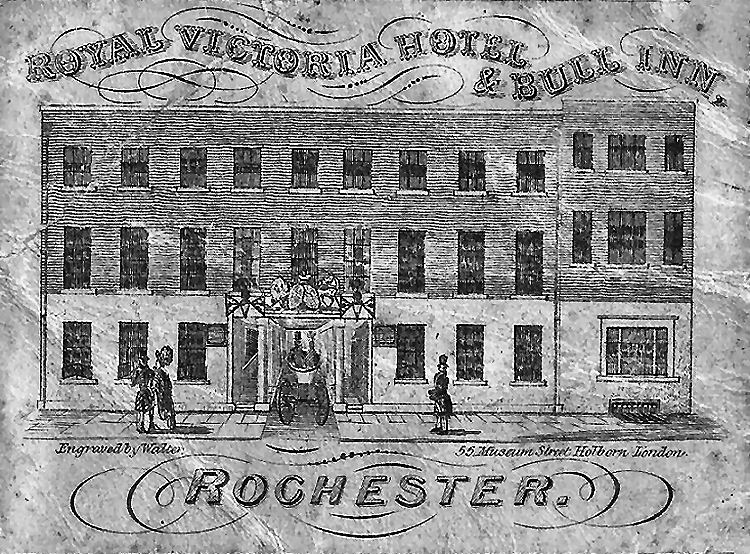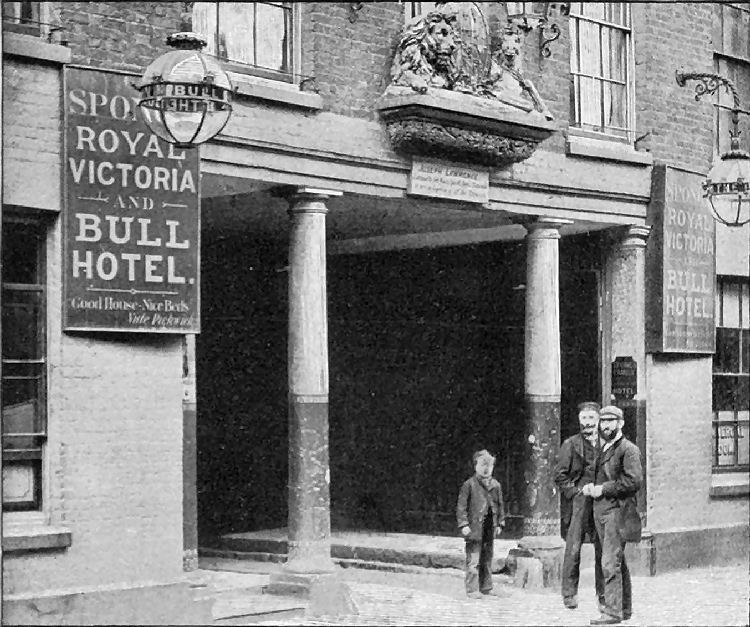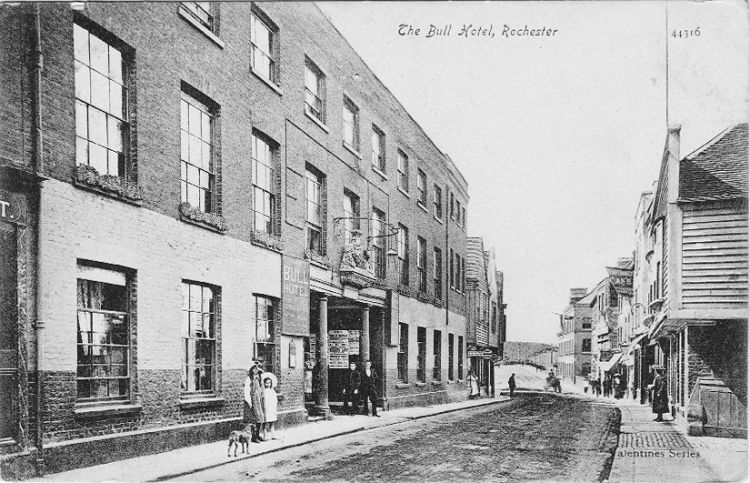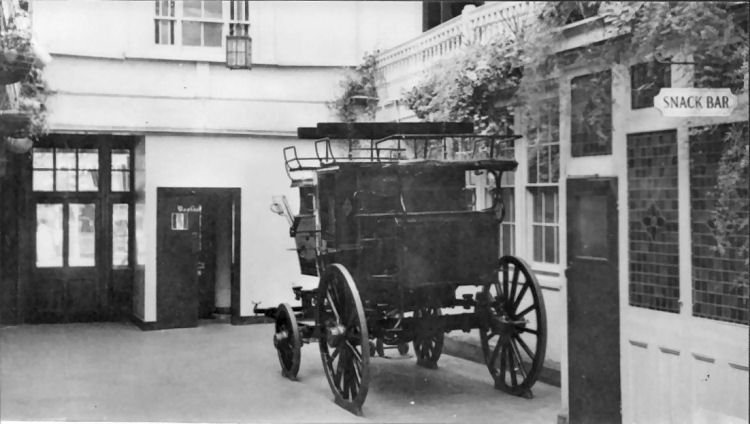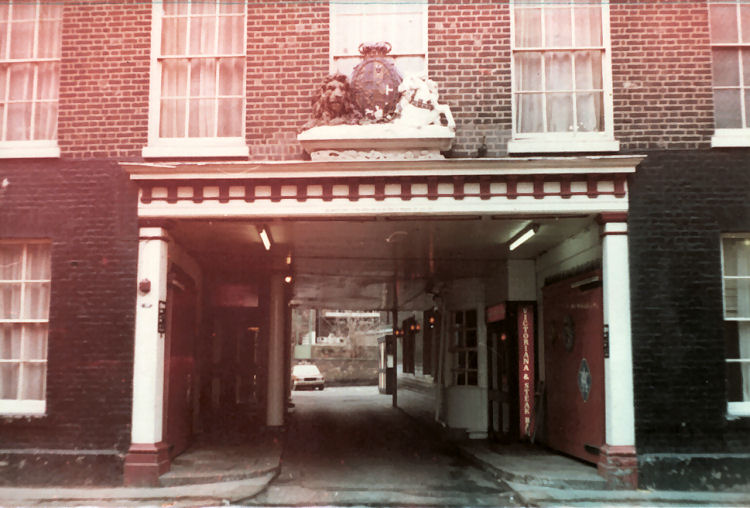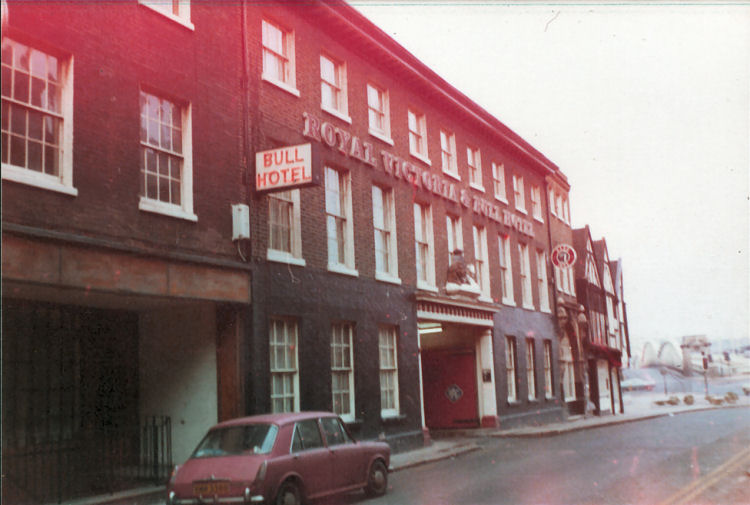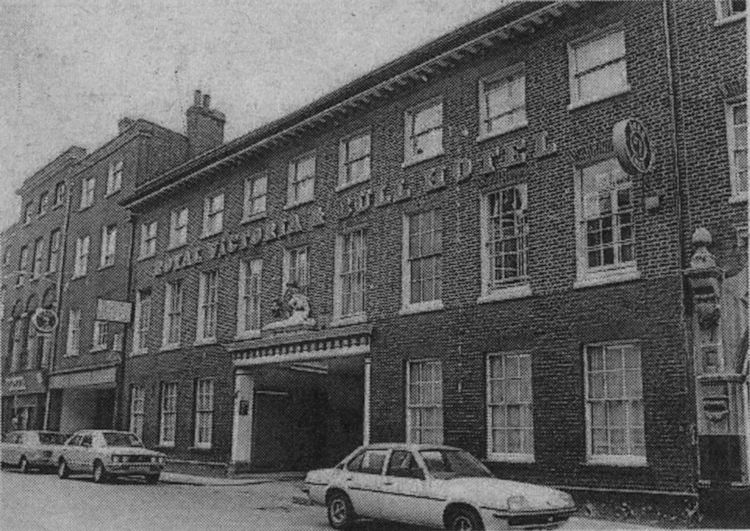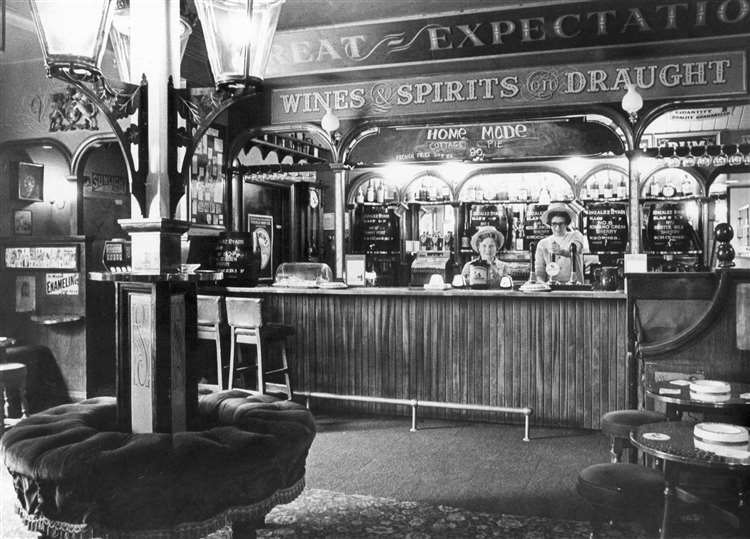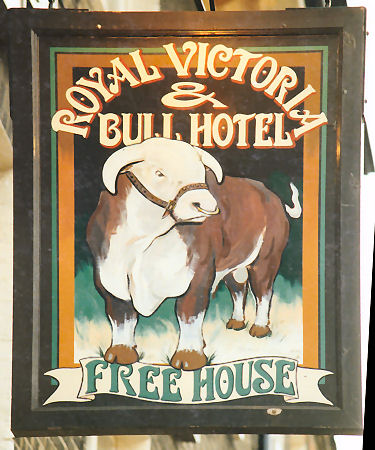|
Southeastern Gazette, 4 January 1853.
At the Petty Sessions, held at the Guildhall, on 'Wednesday,
George
Wakefield, Charles Osborne, and John Dale, were charged with felony;
Wakefield and Osborne for stealing a gun, the property of S. H.
Bluck, Esq.; Wakefield and Dale for stealing a gun and mahogany
case, also the property of Mr. Bluck, from the "Bull Hotel,"
Rochester.
Mr. M’Carthy Stephenson defended Osborne.
George Harris stated that he had been ostler at the "Bull Inn" for
17 years. Mr. Bluck resided there, and was residing there in August
last. On Sunday evening, the 19th of December, witness went into the
granary, where Mr. Bluck’s things were kept. The granary is over the
Coachhouse in the yard: it was always kept locked. He was sent to
fetch the two guns, and went into the bar for the key. He then went
into the loft and searched for them. He found the leather cases in
which they had been, but the guns were gone. One case was to put the
gun in, the other was to put a mahogany case in. He had carried them
into the loft, with other luggage, a long time ago—perhaps a
twelvemonth. He had seen the guns in the cases, but had not seen
them since. He believed those now produced are the same.
Cross-examined:- Mr. Bluck, Mr. McCulloch, and others had access to
the granary, as well as Wakefield. There was a pigeon-house made
there, and Wakefield went up every morning: to feed the pigeons. He
had seen him go up there since August; sometimes twice a day. He
might go a dozen times without witness seeing him. He never saw
Osborne there, unless it was on Seath’s business, when he brought
chaises from the "Silver Oar," which were kept in the Bull yard. He
had known Osborne since he was a boy, and never knew anything
against him. He did not know how long he had been at the "Silver
Oar," but he believed about a year and a half or two years.
John Field, waiter at the "Bull," stated that in consequence of
directions he had received from Mrs. Mc.Culloch he went to Mr.
Coles, the pawnbroker, on Monday, the 20th December, with a written
list of articles to enquire for. He took the gun to the bar of the
"Bull" on the same day. Mr. Bluck was in London. Mrs. Mc.Culloch was
in the bar. He took no duplicate to redeem the gun. He did not see
it again from Monday till the Wednesday following, when it was again
given into his charge by Mrs. Mc.Culloch. After he had obtained
possession of the gun on Monday, he saw Wakefield the same evening,
who was standing in the passage at the "Bull," and saw him come in.
He said, "Oh, my God, I know all about it." Witness saw him again on
Tuesday at the "Bull," with some papers in his hand. He said to him,
"What a foolish young man you must be to commit yourself in this
sort of way." He made a heavy sigh, but said nothing. He saw him
again in the afternoon, about 4 o’clock, in the commercial-room, and
saw him take some pawn tickets from under the carpet. Witness told
him the tickets were of no use, for he had redeemed the gun. He
handed two tickets to witness, who returned them, and Wakefield
burnt them. He saw the name of Coles on one of them.
By the Bench:— He got the money (21s. 4d.) from the bar, and went
and redeemed the gun.
Cross-examined:— Wakefield did not tell me he had given the gun to
Osborne to pawn. Mr. Coles lives between 100 and 200 yards from Mr.
Bluck’s. Mr. Coles’s shop is the nearest to the "Bull" and where
Osborne was living. The pawnbroker gave me the gun on my stating
that it belonged to Mr. Bluck. He did not ask for a ticket. I said
if anything was wanted he knew where to find me.
Mr. J. Coles, pawnbroker, stated that on the evening of the 27th
August, Osborne brought him a gun, and said that a man up the
street, who was short of money, wanted him to pawn it. He wanted
20s. for it. He told his assistant to make out a ticket, and asked
in whose name it was to be. He said in his own name. He gave him the
money and a ticket, and he left the shop. On the 20th December he
gave up the gun to Field. The gun produced was the same.
Cross-examined:— Field produced no ticket or declaration. He said
the parties did not wish to prosecute, if they got the property
back.
Superintendent Tuff said that on the 23rd instant, he apprehended
Wakefield at the "Bull Inn," and told him the charge against him. He
said he was very sorry, and I hoped ho should be forgiven. He said
he had taken one gun to the side window in the passage that looked
into the back yard of the "Silver Oar," and gave it to Charles
Osborne. He then said he took the other gun on the next day to the
"Bull Tap," and gave it to John Dale to go and pawn it, which he
did. That was all his statement. The next day, the 24th, he
apprehended Osborne, telling him what it was for. Osborne said
Wakefield had asked him to take the gun and pawn it, which he did,
and gave him the money. He had previously asked him if it was all
right, and he said it belonged to Mr. Martin, the miller. He pawned
it not knowing but what it was Wakefield’s own property; if he had
known it he would not have pawned it.
Mr. Bluck identified the gun as his property, and valued it at £8.
Mr. Stephenson submitted that the evidence of Superintendent Tuff
was perfectly consistent with the innocence of his client, and a
proof that he had pawned it for Wakefield without guilty knowledge.
The two prisoners were then committed for trial. Osborne was
admitted to bail, himself in £40 and two sureties in £20 each.
Wakefield and Dale were then charged with stealing another gun in a
mahogany case, which also contained some fishing tackle.
The evidence was nearly the same as in the last case.
Mr. Dunning, pawnbroker, of Eastgate, proved that on the 2Sth of
August, Dale brought the gun and case to him and wanted 15s. for it.
Having some suspicion about it, he asked who it belonged to, and he
said to a man outside. He then fetched in Wakefield, who said it was
his own, or that it was all right. He than gave Dale 15s. and a
ticket, and in his book he added Wakefield’s name to Dale’s.
Superintendent Tuff said he apprehended Dale, on the 24th inst. On
telling him what it was for, he said he was in the "Bull Tap," at
Rochester, when Wakefield came in and asked him if he would go and
pawn a gun for him. He brought it out and accompanied the witness to
the pawnbroker's. He received the money for it, and gave it to
Wakefield.
They were both committed for trial.
|
